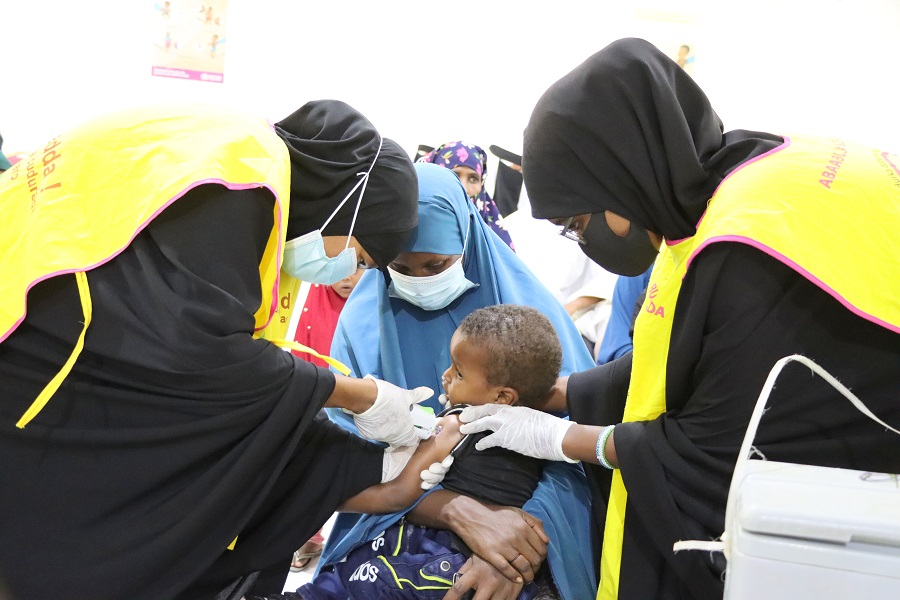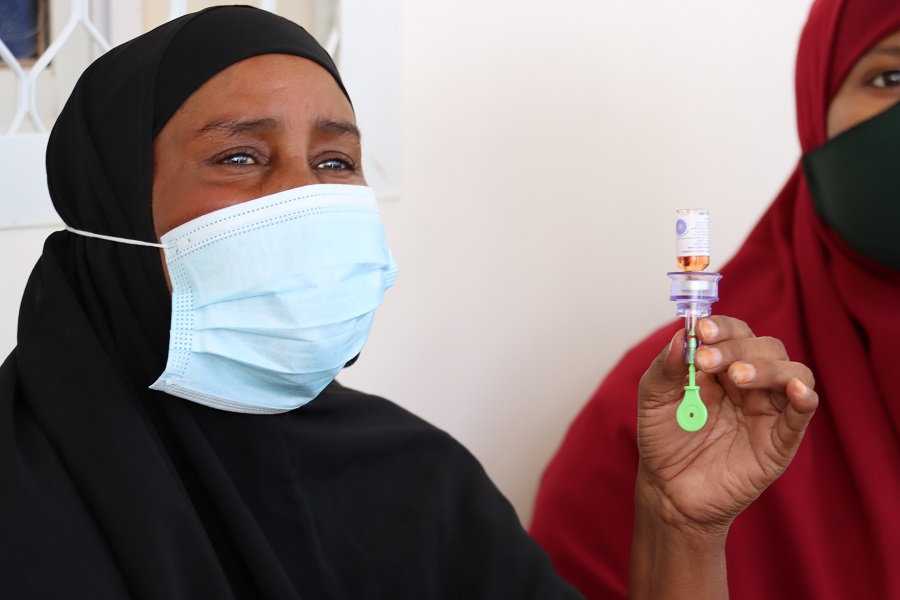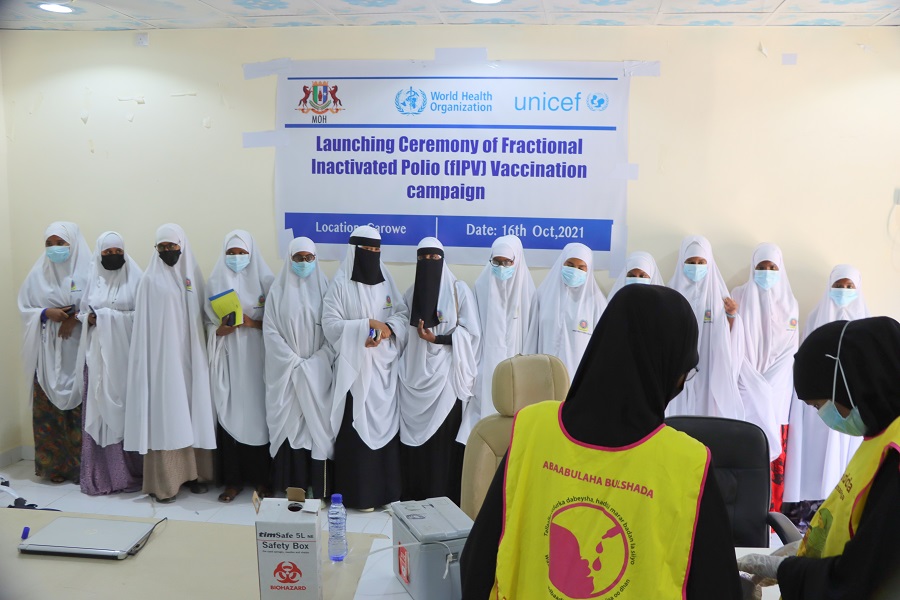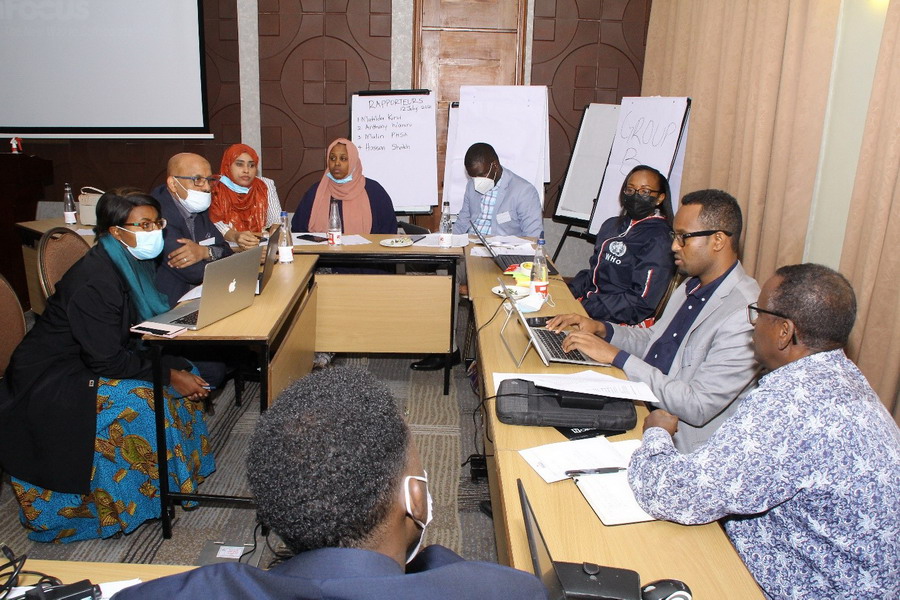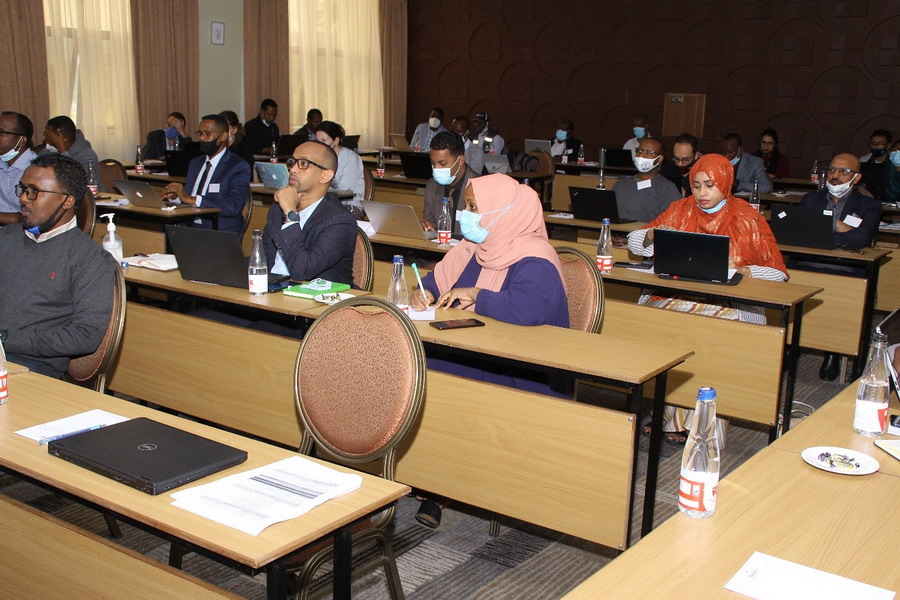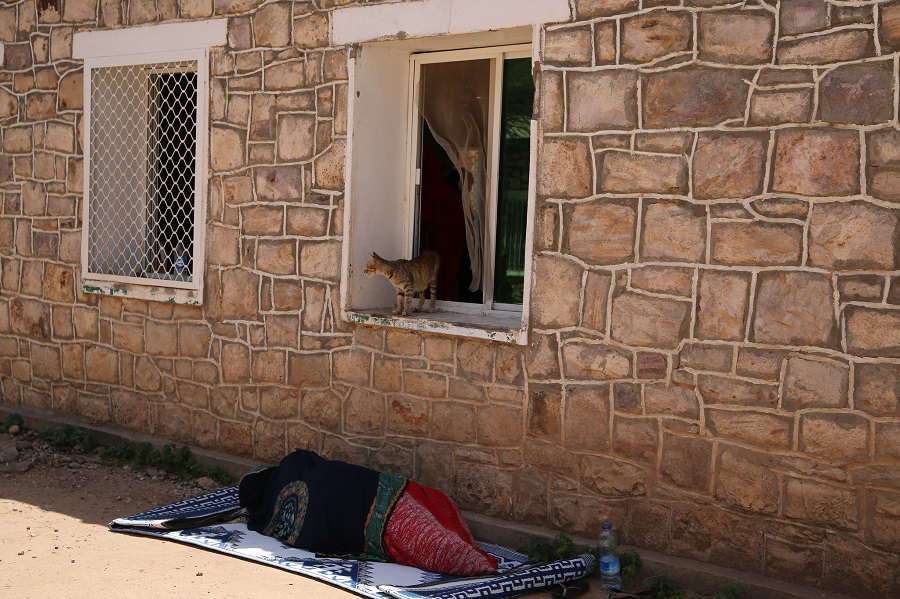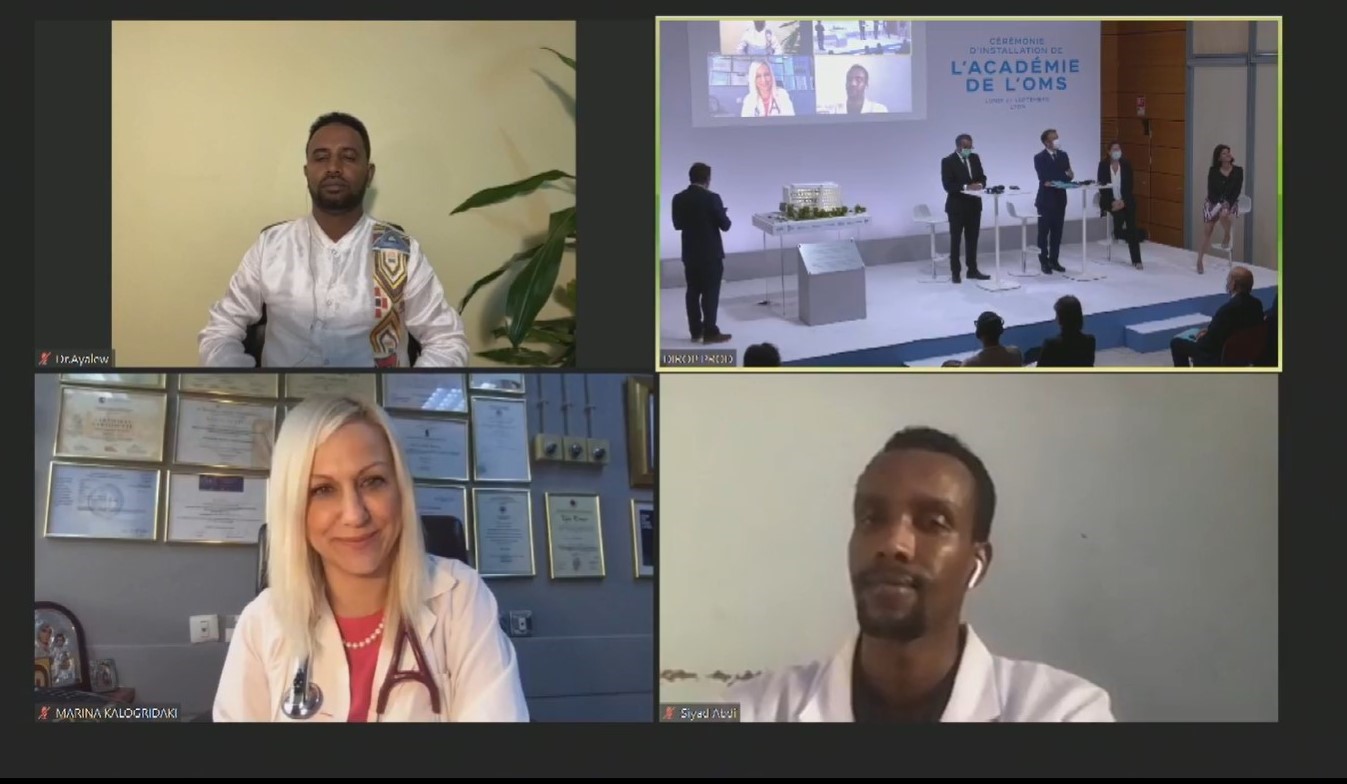25 October 2021 – Having a public health workforce that is able to rapidly detect and respond to disease outbreaks is key for any health system, as recently shown on a worldwide scale with the current COVID-19 pandemic. The importance of this empowered and well-equipped resource is further emphasized by the International Health Regulations (IHR 2005), a legal instrument that encourages countries to prevent, detect and respond appropriately to disease outbreaks.
Taking measures to empower health workforce
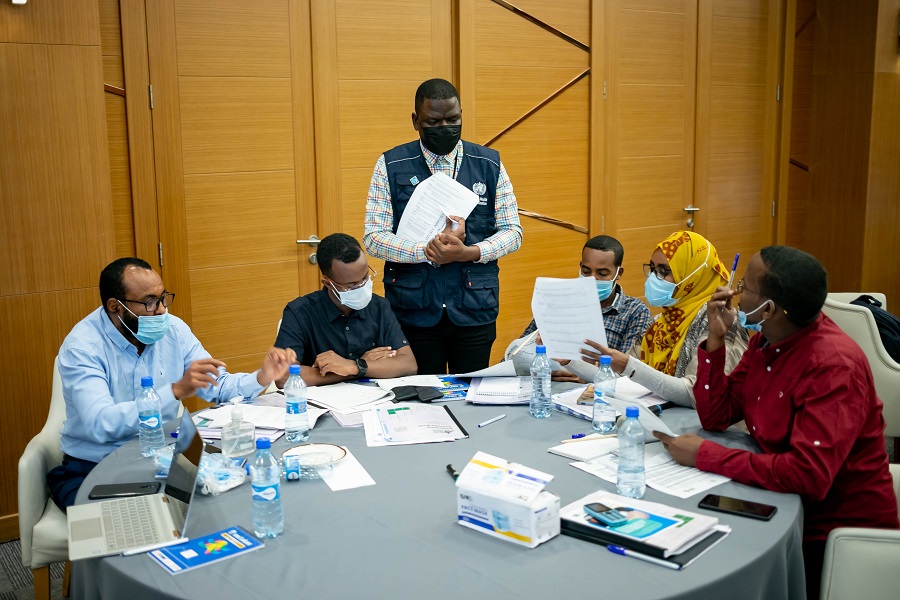 A WHO staff member facilitating a group discussion during the first training workshop for the first cohort of the FETP-Frontline programme
A WHO staff member facilitating a group discussion during the first training workshop for the first cohort of the FETP-Frontline programme
To address Somalia’s limited capacity in disease surveillance and response, largely a result of decades of political instability, civil unrest, climatic shocks, and manmade and health emergencies, the Somalia National Institute of Health (NIH) and the Federal Ministry of Health and Human Services organized the Frontline-Field Epidemiology Training Programme (FETP-Frontline), with support from the Africa Field Epidemiology Network (AFENET), the United States Centers for Disease Control and Prevention (US CDC), the World Health Organization (WHO) and the Public Health Agency of Sweden.
The FETP-Frontline is a 3-month on-the-job training that addresses the critical skills needed to conduct surveillance and response activities effectively at the local level, focusing on improving disease detection, reporting and response. It is based on the premise that improving the epidemiological skills of staff from the Ministry of Health improves their ability to prevent, detect and respond to public health priority issues, which in turn would improve public health security in a country. It aims to improve field epidemiology knowledge, skills and competencies of trainees, and blends mentorship with classroom training and practical experiences to develop the public health workforce of a country. The trainees spend up to 12 days in 3 workshops and the remaining 8–10 weeks back at their jobs, where they conduct field projects to practise, implement and reinforce what they have learned.
The FETP-Frontline is part of a 3-tiered training model which is implemented in many countries based on the recognition that strengthening the capacity of the public health workforce, especially in countries with fragile, vulnerable and conflict-affected countries, is critical at all levels of the health system, from the local to the regional to the national level. All 3 tiers use the same approach of condensed classroom instruction (<25%, followed by field placements >75%) to gain experience and competence in field epidemiology. The other 2 tiers of this training model are called the FETP-Intermediate (9-month programme for staff based at regional or national level) and FETP-Advanced (2-year full time programme for staff at national level).
Rolling out the first phase of the FETP training
The NIH kickstarted the 12-week long FETP-Frontline training programme with a first workshop, conducted from 29 August to 2 September 2021 for 26 participants, followed by practical field experience, and a second training workshop that ran from 6 to 12 October 2021.
Dignitaries attending the launch of the FETP training on 29 August included Dr Abdinasir Mukhtar Ibrahim, the Director-General of the Federal Ministry of Health and Human Services; Dr Mamunur Rahman Malik, the WHO Representative to Somalia; representatives from the Intergovernmental Authority on Development (IGAD) Mission; and Dr Abdifatah Diriye Ahmed, the Director of the NIH for Somalia. Others who attended included the technical team from AFENET.
The first of 3 tiers of training, the initial phase focused on training health workers at the frontlines of public health surveillance.
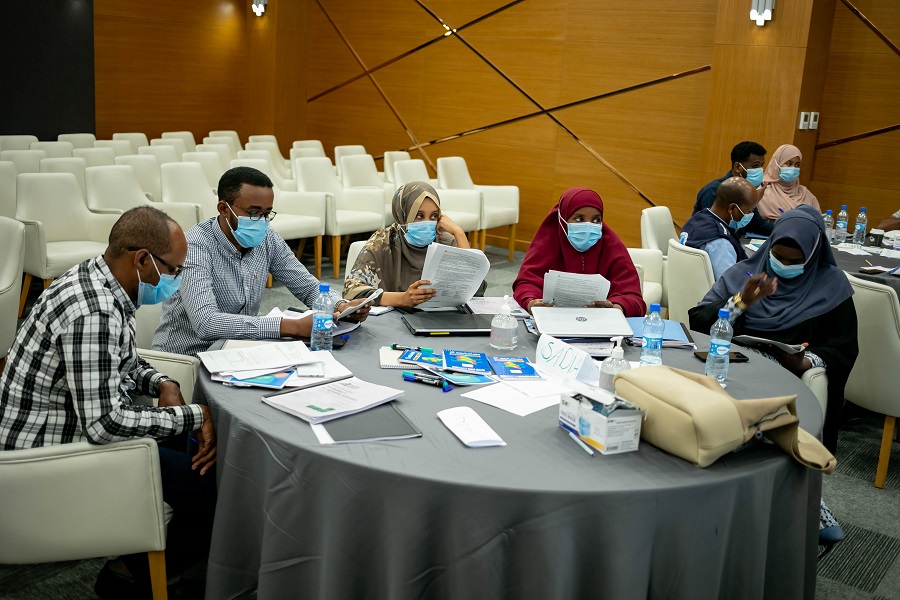 Participants at the Somalia Frontline Field Epidemiology Training Programme
Participants at the Somalia Frontline Field Epidemiology Training Programme
Streamlining reporting through field experiences
Adan Mohamed Ali, who serves the National Malaria Control Programme run by the Federal Ministry of Health of Somalia, was one of the first 26 participants to attend this preliminary FETP training.
He explains that during the first phase of the 5-day classroom learning, he learnt a lot about disease surveillance, monitoring and evaluation, descriptive epidemiology and case investigation. As part of the on-the-job training, which comprises 75% of each training, Adan visited health facilities in the district of Kahda, Banadir region. The second set of training focused on presenting the results, outbreak investigation and response, laboratory collection and transport, problem analysis and communication.
“While conducting the audit, I was supposed to visit 6 health facilities. However, only 2 were still functioning and one was reporting to the Early Warning Alert and Response Network (EWARN). I tried to convince the facilities that were not reporting to do so, and help in the search for diseases, which would help the Government to prevent spread of diseases in communities,” explains Aden. “Through the field exercise, I learnt to identify gaps and challenges of disease surveillance and response in health facilities. I studied records for epidemiological weeks 1-36 for this year by reviewing log books, tally sheets, charts and graphs and interviewed health facility staff on reporting disease alerts, timeliness of reporting and discussed challenges the staff face in timely reporting of alerts.”
He added that efforts like this were important as they would help the country’s health system to streamline reporting of alerts and surveillance for epidemic-prone diseases.
Upon completion of the 3-month FETP-Frontline training programme, Adan and other successful trainees will move on to the intermediate and later advanced level courses, while at the same time becoming trainers for the next cohort.
Impact of the FETP
The evaluation of the first series of trainings shows an encouraging improvement in trainees’ knowledge, which is now being applied in their daily work. This programme will increase the capacity of Somalia’s health workforce in disease surveillance and outbreak response at all levels of service delivery. Moreover, the training will develop the capacity of trainees and health facilities to detect and respond to disease outbreaks in a timely manner and minimize the spread of diseases to contain them. Trainees will also gain skills to communicate risk to the public and design messages that will support policy- and decision-makers to implement effective public health responses.
“The WHO country office for Somalia is fully committed to continue working alongside the NIH, the CDC and AFENET to roll out the next steps of the FETP programme in Somalia, which will bring the country closer to bridging the current gap in number of epidemiologists per 100 000 population in Somalia and build a strong cadre of disease detectives in line with the requirements of the IHR 2005,” said Dr Mamunur Rahman Malik, WHO Representative to Somalia.
“The Frontline-FETP is one of the outcomes of the strong collaboration between the Federal Ministry of Health and our health development partners in addressing the most critical challenges of our health system, which is human resources for health,” said Dr Abdifatah Diriye Ahmed, NIH Director.
The WHO’s work in supporting the country’s FETP-Frontline training programme in Somalia is supported by the Swedish International Development Cooperation Agency (SIDA) and the work reflects WHO’s strong collaboration with its partner- The Public Health Agency of Sweden to promote and support the activities of the NIH.





